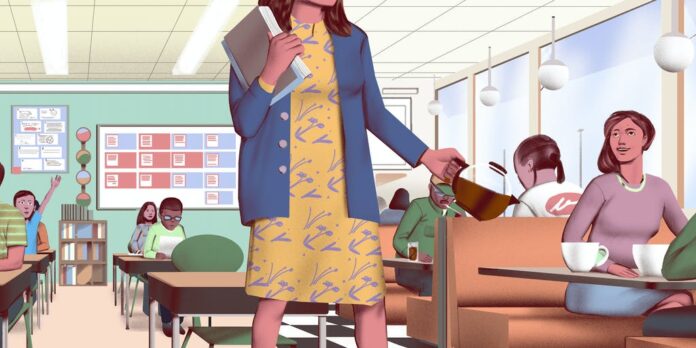Inside the career, it’s a truth of life, in accordance with Eleanor Blair, writer of the 2018 guide, “By the Mild of the Silvery Moon: Trainer Moonlighting and the Darkish Facet of Lecturers’ Work,” and a professor at Western Carolina College.
“Trainer moonlighting is like some soiled little secret that everyone knows about, we speak about, academics share concepts about, however no one needs to place it on the desk—that we work at Steak ‘n’ Shake or these different locations,” stated Blair, a former public faculty trainer who used to moonlight as a waitress.
Information is imperfect and typically lags just a few years behind, however numerous credible estimates—from the federal authorities’s Nationwide Middle for Schooling Statistics (NCES) to the Nationwide Schooling Affiliation (NEA), the biggest academics’ union within the nation—discover {that a} important share of U.S. public faculty academics work at the very least one different job to complement their earnings. For brand new academics, that earnings averages simply over $41,000, in accordance with knowledge from the 2019-20 faculty yr collected by the NEA, whereas the typical trainer wage throughout all ranges of schooling and years of expertise is about $64,000.
The latest knowledge made public by the NCES, drawing on surveys carried out within the 2017-18 faculty yr, discovered that 18 %—or about 600,000—public faculty academics within the U.S. held second jobs exterior the college system through the faculty yr, making academics about thrice as seemingly as all U.S. staff to juggle a number of jobs directly.
Different measures that account for second jobs each exterior and inside the faculty system have discovered the association to be significantly extra prevalent. NEA Analysis carried out a survey of greater than 1,300 public faculty academics in late 2020, asking them concerning the jobs they held in 2019, and located that 41 % of preK-12 academics labored multiple job. The NEA survey additionally breaks down what sort of second jobs academics have. (These survey findings are being launched publicly right here for the primary time with permission from NEA.)
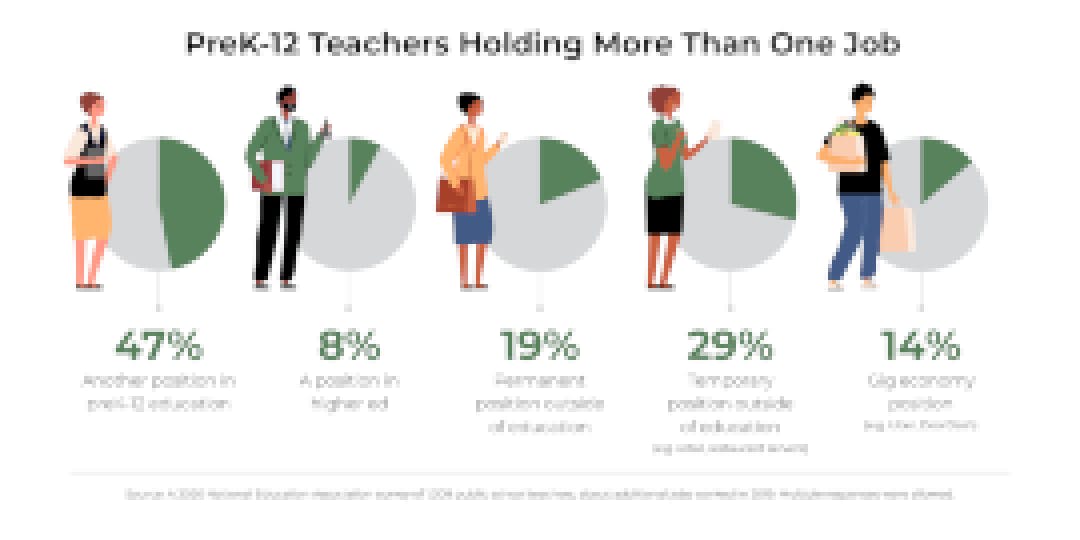
Of the academics who stated they work at the very least one different job, 17 % reported working their second job on weekdays within the early mornings earlier than faculty, 62 % stated they labored weekdays after faculty hours, and 48 % stated they put of their hours on weekends through the faculty yr.
“It’s actually type of disheartening once you suppose that many academics not solely have bachelor’s levels however grasp’s levels and nonetheless should hustle for his or her earnings. It sends a message,” stated Donna M. Davis, an schooling historian and professor on the College of Missouri-Kansas Metropolis.
She added: “The system is clearly damaged when now we have extremely certified professionals needing to complement their earnings to outlive, who’re one disaster—one paycheck—away from full destroy.”
In a nationwide survey of almost 1,200 classroom academics carried out in spring 2021 by the Trainer Wage Venture, a nonpartisan group, 82 % of respondents stated they both at the moment or beforehand had taken on a number of jobs to make ends meet. Of them, 53 % stated they had been at the moment working a number of jobs, together with 17 % who held jobs unrelated to instructing.
In a free-response portion of the Trainer Wage Venture’s survey, tons of of academics known as out the sphere for failing them, describing repeatedly the “humiliating” experiences they endure to remain in a career that the general public purports to worth.
“It is embarrassing, as a college-educated skilled, to be provided associates’ basements as a spot to remain in order that I do not find yourself homeless for a bit,” wrote one trainer in Colorado.
“There have been months once I had to decide on between a physician’s or dentist’s appointment for myself,” wrote one other trainer, who lives in North Carolina. “I’m so removed from residing the dream.”
One other stated: “It may be a battle deciding what invoice to pay and what invoice to skip so we are able to eat.”
Maybe most jarring of all was the trainer in California who stated that, so as to assist her household financially, she has grow to be a surrogate mom. Twice. “I’m actually renting out my uterus to make ends meet,” she wrote.

As the info suggests, almost half of academics’ second jobs are education-adjacent, resembling tutoring, nannying and training. However the majority maintain jobs exterior of schooling. Suppose: restaurant servers, bartenders, Lyft and Uber drivers, meals couriers for DoorDash, grocery consumers for Instacart, actual property brokers, cosmetics gross sales representatives and retail associates.

“It is vital to differentiate between jobs that persons are doing as a result of it’s one thing that they are enthusiastic about … versus somebody who’s taking over that extra work as a result of it is the one method they’ll make ends meet,” stated former Schooling Secretary John B. King, now a candidate for governor in Maryland. “And sadly, as a result of trainer pay is not what it must be, many of us are in that latter class.”
In interviews, economists and historians described how second jobs that align with schooling—say, an artwork trainer who sells paintings to purchasers exterior of faculty—are extra palatable than second jobs exterior of the sphere solely.
“For anyone whose facet gig is taking part in within the native symphony, individuals might say, ‘Yeah, it’s nice to have an actual musician instructing the youngsters music,’” defined Dick Startz, a professor of economics on the College of California, Santa Barbara. “However somebody who’s searching for Instacart? We’re glad somebody does it, however a trainer is just not who we anticipate that particular person to be.”
When academics’ exterior work is career-related, even when it’s not elective, it could at the very least be enriching and fulfilling, argued Paul Fitchett, an assistant dean and professor on the College of North Carolina in Charlotte who beforehand labored as a public faculty trainer. “I don’t suppose that every one moonlighting is dangerous, particularly if it’s in your job sector,” stated Fitchett, who used to do monetary administration for a temp company through the summers.
A couple of of the academics interviewed for this story argued that their work exterior the classroom was refreshing and gave them alternatives to socialize with different adults. However on the entire, academics who should work in unrelated roles to earn their further earnings discovered it demoralizing.
“I’ve completed DoorDash. I’ve completed Shipt grocery supply. However each time I do this, it feels disheartening,” stated Ashley Delaney, a highschool artwork trainer in Paterson, New Jersey, who has been within the classroom for 2 years. “I went to highschool for instructing, however I can’t afford to pay my payments except I ship individuals’s quick meals?”
Now, attempting to maintain her facet hustles within the realm of schooling, she tutors after faculty, babysits and sometimes accepts commissions for pet portraits. She is an artwork trainer, in any case.


This pattern of academics working a number of jobs is hardly new. However pandemic-related stressors and the strain of rising inflation, which forces them to stretch every greenback ever additional, have propelled academics to re-evaluate the cost-benefit calculations they’d accepted way back and to reimagine how the remainder of their careers would possibly look. Some are plotting to depart the sphere, hoping to roll their facet hustle right into a full-time job; others have already left. The bulk interviewed for this story, although, nonetheless love instructing and don’t need to go away it in the event that they don’t should. However to remain, one thing must change, they stated. They will’t preserve working further jobs to subsidize their inadequate salaries.
“It’s unhappy, as a result of I believed I’d spend my life being a trainer. I like instructing,” stated Reaghan Murphy, a particular schooling trainer exterior of Chicago who bartends and nannies on weeknights and weekends. “That is what I need to do, but it surely’s simply not sustainable.”
That’s the issue with academics who moonlight, stated Blair, the writer of one of many solely books on the subject. Those who care sufficient concerning the children, who imagine within the transformative energy of instructing, are those who keep. And so as to afford to proceed being a trainer, they should run themselves ragged working a number of jobs. Why, she requested, is that this nation doing so little to maintain them of their jobs?
“If anyone needs to do the job, we have to discover methods to assist them and assist them achieve success,” she stated emphatically. “Promoting cosmetics or driving an Uber is just not serving to them to be a trainer.”
However whereas Blair and others have concepts for constructing pathways for profession growth, progress nationally has stalled. For years, truly.
Although academics throughout the U.S. have acquired modest pay will increase over the previous twenty years, these raises haven’t been sufficient to maintain tempo with inflation in lots of locations. Consequently, academics’ precise earnings between the years 1999-2000 and 2020-21 stagnated in two states, and in 27 states, they declined.
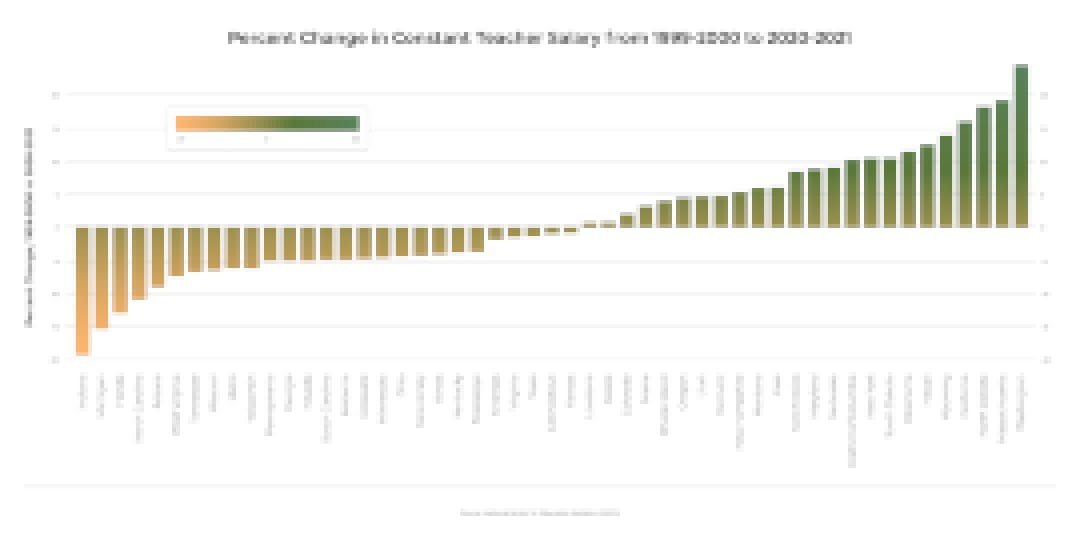
The worst offender of all is Rothrock’s Hoosier state, the place, adjusted for inflation, common trainer pay has declined by nearly 20 % since 1999-2000, a couple of yr earlier than Rothrock landed her first instructing place.
On paper, Rothrock makes about $60,000 per yr now, greater than double her beginning wage of $29,000. However adjusted for inflation, her beginning wage in January 2001 would have the shopping for energy of $47,000 at the moment. This implies her wage, in actual {dollars}, has elevated by solely $13,000 in 21 years.

The pervasiveness with which academics work second jobs stays, at finest, invisible and, at worst, permissible to most of the people.
Take a look at common tradition, which perpetuates the normalization of the trainer facet hustle. Within the pilot episode of the hit tv sequence “Breaking Dangerous,” protagonist Walter White, a highschool chemistry trainer, is proven working after faculty at a automobile wash. His college students mock him for it. Later, White turns to creating and promoting methamphetamines to cowl his medical payments and safe his household’s monetary future. Within the teen comedy movie “Imply Ladies,” Sharon Norbury, the highschool calculus trainer performed by Tina Fey, bartends a few nights per week at a restaurant within the mall. Each White and Norbury are made to really feel degraded by their part-time jobs. However as a viewer, whereas there’s the shock issue of White’s facet job as a drug trafficker, the truth that these academics would have a facet job in any respect is introduced as quotidian.
Among the many public, misconceptions concerning the instructing career abound, main many to view academics’ facet hustles as innocuous. The belief is that instructing is straightforward work, with quick days ending at 3 p.m. and summers off, making the season well-suited for incomes further wages.
Of the 30 academics I interviewed, whose annual salaries vary from $32,000 to $98,000, each single one disputed that concept. So did King, the Schooling Secretary through the Obama administration and a former classroom trainer.
“A number of the issues individuals miss is on a regular basis that academics spend … making ready for sophistication, planning for sophistication, on a regular basis that academics spend grading and pupil work, and giving college students and households suggestions on pupil studying,” King defined.
Most individuals, he added, additionally overlook the advantages which are constructed into {many professional} roles however not accessible to academics, resembling the flexibleness to schedule a physician appointment on a Thursday morning or to excuse your self to the restroom with none planning or strategizing. “That degree of depth is, I feel, completely different from loads of different work settings,” King stated.
“We ask an incredible quantity of academics,” he added. “We additionally ask them to carry the emotional weight of all of the issues their college students are going by way of. And so I feel we have to guarantee that the compensation and esteem for the career displays the extraordinary work persons are doing each day.”
Even earlier than the pandemic, however particularly now, academics are anticipated to be not solely instructors, facilitators and subject material consultants, however mentors, household liaisons, behavioral interventionists and no matter else the disaster du jour calls for. With workers shortages ballooning into an all-out disaster of its personal in current months, many academics’ planning intervals have disappeared, as they fill in for absent colleagues down the corridor, forcing lesson prep, grading, emails and different ancillary work into the evenings and weekends. For academics who choose up shifts after conventional faculty hours, or activate apps like Lyft and DoorDash to earn some quick money, the strain of determining when and find out how to get all of it completed—to pay the payments, to be an efficient trainer, and do all of it with a constructive angle—has snowballed right into a state of affairs that now not feels tenable.
The balancing act takes a toll not solely on academics’ psychological well being but additionally on the standard of instruction they’re offering within the classroom.
Marcus Blankenship, a sixth grade historical past trainer in Asheville, North Carolina, who drives for Lyft just a few instances per week after faculty and on weekends, described the extraordinary fatigue that units in after eight hours of being “on” together with his 11-year-old college students and one other 4 or 5 hours of being “on” together with his passengers, a lot of whom are vacationers longing for a full record of native suggestions or a regional historical past lesson.
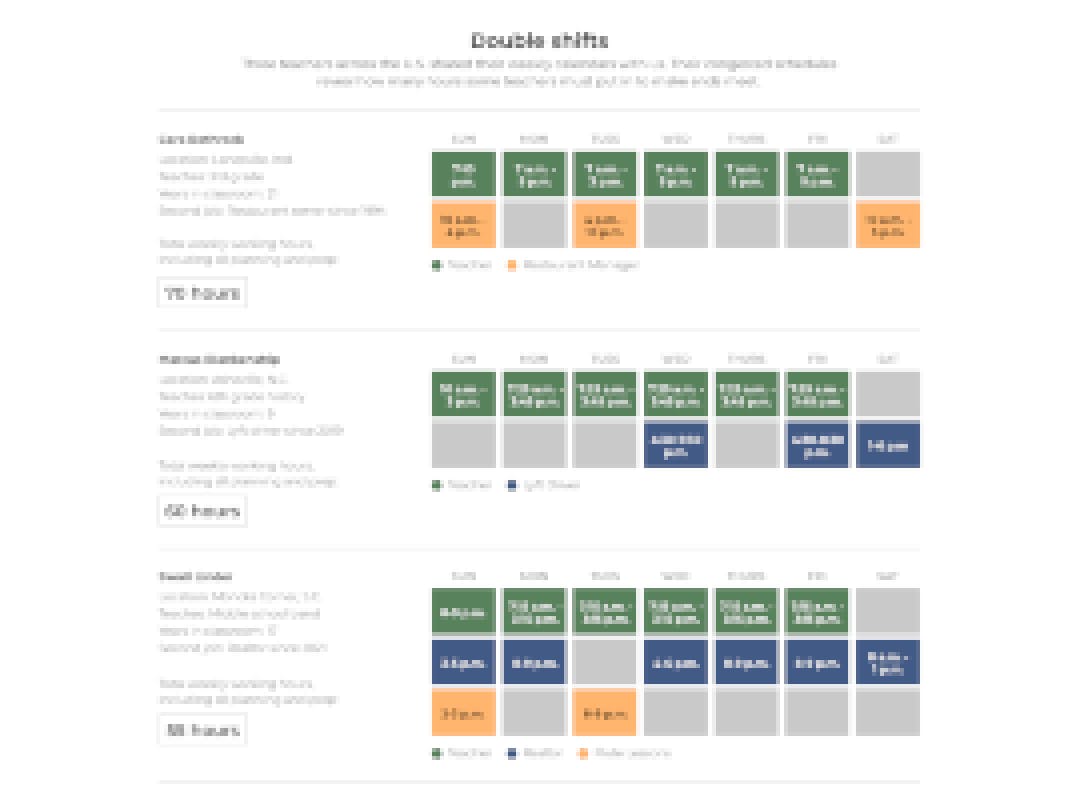
Fitchett, the professor on the College of North Carolina in Charlotte who doesn’t view moonlighting as troublesome in all circumstances, stated, “It’s the during-the-year work once you’re instructing from 7:30 a.m. to three:30 p.m. then leaping in an Uber from 4:30 to 11 p.m.” that’s the issue. That rings true for Blankenship.
“It is mentally exhausting by the top. What I must do once I get dwelling, at that time, is both grade papers or write lesson plans. However I simply do not have it. I haven’t got it left in me,” Blankenship defined. “I am unable to be the most effective trainer that I need to be and do every little thing I must do so as to stay.”
Monet Gooch, a particular schooling science trainer in Prince George’s County, Maryland, will get shocked reactions from all sides about her exterior jobs tutoring, modeling and doing occasion safety for concert events {and professional} sports activities video games within the Washington, D.C. space.
Her eighth graders have requested her why she’s late to highschool. They will’t imagine it when she explains that she has an extended commute and works different jobs after instructing.
“Certainly one of my college students was, like, ‘You’ve got to decelerate. Why do you’re employed a lot?’” Gooch recalled. “And I used to be like, ‘Properly, instructing would not pay sufficient. I gotta pay my payments.’”
Gooch’s coworkers on the occasion safety gig—the place a handful of different academics from her faculty additionally work—are floored to seek out out that she is a public faculty trainer.
“Anyone will ask, like, what do I do through the day?” she defined. “I inform them that I am a full-time trainer and so they’ll ask, ‘How are you doing this and instructing?!’”
To that she replies with the identical reply she offers her college students: She has to pay the payments.

A lot of elements contribute to how far a trainer’s wage goes—household construction, caregiving duties, well being points and pupil loans amongst them. Whereas many academics within the U.S. should work second jobs to stay comfortably, a lot don’t.
A few of them stay in states that pay higher than others. An EdSurge evaluation of 2019-20 trainer wage knowledge, adjusted for price of residing, discovered the 5 states that pay academics the very best are Massachusetts, Rhode Island, New York, Pennsylvania and Connecticut. Rothrock’s state of Indiana, together with the Carolinas, falls within the backside 20.
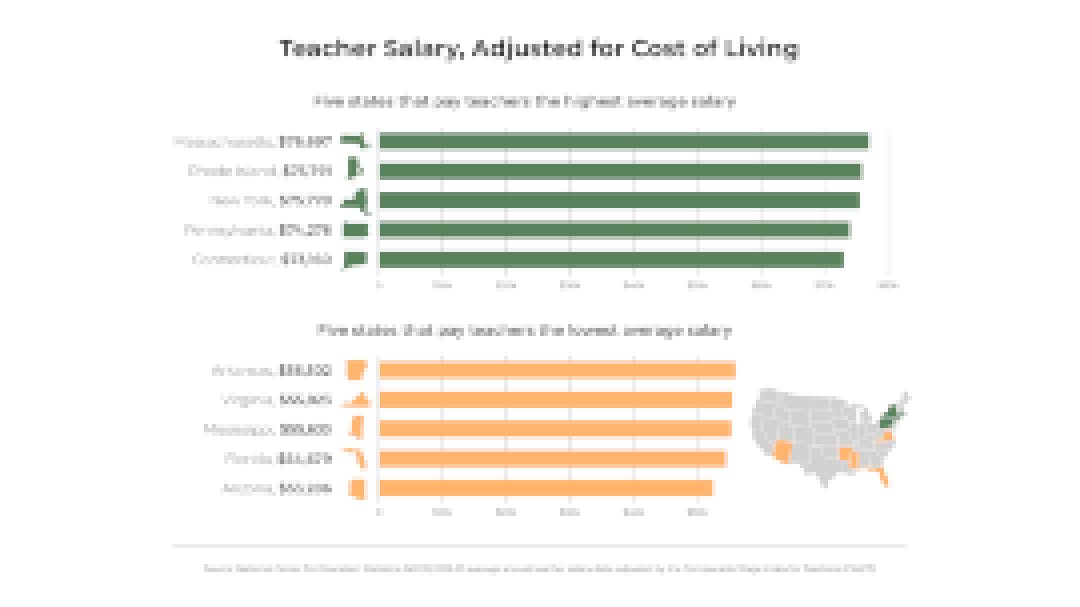
However it’s not nearly geography. Others have companions or relations who assist them. Dozens of academics who stuffed out the Trainer Wage Venture’s survey final yr famous that, if not for his or her partner’s earnings—which was in some circumstances a number of instances better than their very own wage—they’d be working extra jobs.
“It is vitally hectic and tough to remain motivated and really feel revered as knowledgeable when you recognize you wouldn’t be capable of assist your loved ones in your earnings,” a trainer in Colorado wrote. “If it wasn’t for my husband’s job, I wouldn’t be capable of afford housing in my space and supply for my children.”
Each trainer I interviewed had their very own causes for taking over a second job. Some had been single or divorced and needed to carry their hire or mortgage funds with their sole earnings. Others had been single mother and father or caregivers, chargeable for masking the bills of others, or had household medical points that siphoned away a lot of their month-to-month take-home pay. Many had been married to different educators or had a associate with a equally modest earnings, and various them had onerous quantities of pupil mortgage debt to pay down every month.
Delaney, the artwork trainer and tutor in New Jersey, was certainly one of many single academics who identified an assumption within the career that educators simply should get by on their salaries for the primary few years, till they discover a associate who can assist them financially.
“That’s not all the time the case,” she stated, noting that she lately determined to stay and not using a roommate for the primary time and that it has prompted great monetary stress. “Grown grownup academics shouldn’t should depend on a associate to stay by themselves.”
For educators whose lives didn’t comply with their deliberate trajectory, there’s little to no margin for error. Any disruption or deviation from what’s “regular”—going by way of a divorce, having a toddler with a incapacity, being single of their mid-30s—will be financially devastating on a trainer’s wage.

